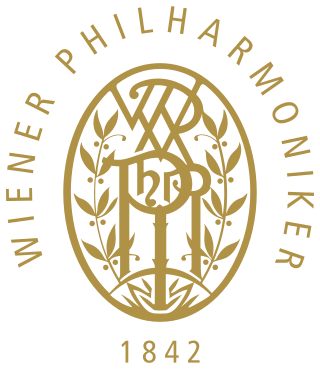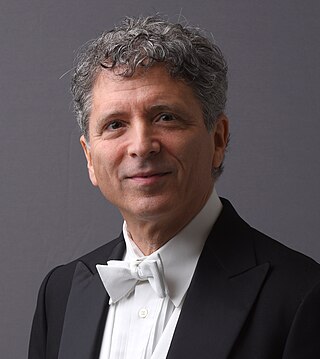
Gustav Heinrich Ernst Martin Wilhelm Furtwängler was a German conductor and composer. He is widely regarded as one of the greatest symphonic and operatic conductors of the 20th century. He was a major influence for many later conductors, and his name is often mentioned when discussing their interpretative styles.

Sir Simon Denis Rattle is a British-German conductor. He rose to international prominence during the 1980s and 1990s, while music director of the City of Birmingham Symphony Orchestra (1980–1998). Rattle was principal conductor of the Berlin Philharmonic from 2002 to 2018. He has been the music director of the London Symphony Orchestra since September 2017. Among the world's leading conductors, in a 2015 Bachtrack poll, he was ranked by music critics as one of the world's best living conductors.
The Berlin Philharmonic is a German orchestra based in Berlin. It is one of the most popular, acclaimed and well-respected orchestras in the world.

The Vienna Philharmonic is an orchestra that was founded in 1842 and is considered to be one of the finest in the world.

The Philharmonia Orchestra is a British orchestra based in London. It was founded in 1945 by Walter Legge, a classical music record producer for EMI. Among the conductors who worked with the orchestra in its early years were Richard Strauss, Wilhelm Furtwängler and Arturo Toscanini; of the Philharmonia's younger conductors, the most important to its development was Herbert von Karajan who, though never formally chief conductor, was closely associated with the orchestra in the late 1940s and early 1950s. The Philharmonia became widely regarded as the finest of London's five symphony orchestras in its first two decades.

Otto Nossan Klemperer was a conductor and composer, originally based in Germany, and then the US, Hungary and finally Britain. His early career was in opera houses, but he became better known as a concert-hall conductor.

Sir Georg Solti was a Hungarian-British orchestral and operatic conductor, known for his appearances with opera companies in Munich, Frankfurt and London, and as a long-serving music director of the Chicago Symphony Orchestra. Born in Budapest, he studied there with Béla Bartók, Leó Weiner and Ernő Dohnányi. In the 1930s, he was a répétiteur at the Hungarian State Opera and worked at the Salzburg Festival for Arturo Toscanini. His career was interrupted by the rise of the Nazis' influence on Hungarian politics and, being of Jewish background, he fled the increasingly harsh Hungarian anti-Jewish laws in 1938. After conducting a season of Russian ballet in London at the Royal Opera House he found refuge in Switzerland, where he remained during the Second World War. Prohibited from conducting there, he earned a living as a pianist.

Conducting is the art of directing a musical performance, such as an orchestral or choral concert. It has been defined as "the art of directing the simultaneous performance of several players or singers by the use of gesture." The primary duties of the conductor are to interpret the score in a way that reflects the specific indications in that score, set the tempo, ensure correct entries by ensemble members, and "shape" the phrasing where appropriate. Conductors communicate with their musicians primarily through hand gestures, usually with the aid of a baton, and may use other gestures or signals such as facial expression and eye contact. A conductor usually supplements their direction with verbal instructions to their musicians in rehearsal.

Claudio Abbado was an Italian conductor who was one of the leading conductors of his generation. He served as music director of the La Scala opera house in Milan, principal conductor of the London Symphony Orchestra, principal guest conductor of the Chicago Symphony Orchestra, music director of the Vienna State Opera, founder and director of Lucerne Festival Orchestra, founder and director of Mahler Chamber Orchestra, founding Artistic Director of Orchestra Mozart, music director of European Union Youth Orchestra, and principal conductor of the Berlin Philharmonic orchestra.

Herbert von Karajan was an Austrian conductor. He was principal conductor of the Berlin Philharmonic for 34 years. During the Nazi era, he debuted at the Salzburg Festival, with the Vienna Philharmonic, the Berlin Philharmonic, and during the Second World War he conducted at the Berlin State Opera. Generally regarded as one of the greatest conductors of the 20th century, he was a controversial but dominant figure in European classical music from the mid-1950s until his death. Part of the reason for this was the large number of recordings he made and their prominence during his lifetime. By one estimate, he was the top-selling classical music recording artist of all time, having sold an estimated 200 million records.

Lorin Varencove Maazel was an American conductor, violinist and composer. He began conducting at the age of eight and by 1953 had decided to pursue a career in music. He had established a reputation in the concert halls of Europe by 1960 but, by comparison, his career in the U.S. progressed far more slowly. He served as music director of The Cleveland Orchestra, Orchestre National de France, Pittsburgh Symphony Orchestra, Bavarian Radio Symphony Orchestra, and the New York Philharmonic, among other posts. Maazel was well-regarded in baton technique and possessed a photographic memory for scores. Described as mercurial and forbidding in rehearsal, he mellowed in old age.

The Salzburg Festival is a prominent festival of music and drama established in 1920. It is held each summer, for five weeks starting in late July, in Salzburg, Austria, the birthplace of Wolfgang Amadeus Mozart. Mozart's operas are a focus of the festival; one highlight is the annual performance of Hofmannsthal's play Jedermann (Everyman).

Seiji Ozawa is a Japanese conductor known for his advocacy of modern composers and for his work with the San Francisco Symphony, the Toronto Symphony Orchestra, the Vienna State Opera, and the Boston Symphony Orchestra, where he served as music director for 29 years. He is the recipient of numerous international awards.

The Staatsoper Unter den Linden, also known as the Berlin State Opera, is a listed building on Unter den Linden boulevard in the historic center of Berlin, Germany. The opera house was built by order of Prussian king Frederick the Great from 1741 to 1743 according to plans by Georg Wenzeslaus von Knobelsdorff in the Palladian style. Damaged during the Allied bombing in World War II, the former Royal Prussian Opera House was rebuilt from 1951 to 1955 as part of the Forum Fridericianum square. Nicknamed Lindenoper in Berlin, it is "the first theater anywhere to be, by itself, a prominent, freestanding monumental building in a city."

Mariss Ivars Georgs Jansons was a Latvian conductor, best known for his interpretations of Mahler, Strauss, and Russian composers such as Tchaikovsky, Rachmaninoff, and Shostakovich. During his lifetime he was often cited as among the world's leading conductors; in a 2015 Bachtrack poll, he was ranked by music critics as the world's third best living conductor. Jansons was long associated with the Bavarian Radio Symphony Orchestra and Royal Concertgebouw Orchestra as music director.

Victor de Sabata was an Italian conductor and composer. He is widely recognized as one of the most distinguished operatic conductors of the twentieth century, especially for his Verdi, Puccini and Wagner.

Christian Thielemann is a German conductor. He is currently chief conductor of the Staatskapelle Dresden. He was artistic director of the Salzburg Easter Festival from 2013 to 2022.

Ronald Braunstein is an American orchestral conductor. He is currently the music director and conductor of Me2/, the world's only classical music organization created for individuals living with mental illnesses and the people who support them. He lives in Malden, Massachusetts with his wife, Caroline.

Zheng Xiaoying is a Chinese conductor and was the first female conductor in China. Zheng was the chief conductor of the China National Opera House (CNOH) and she formed and conducted the Xiamen Philharmonic Orchestra. She was formerly the director of the Conducting Department of the Beijing Central Conservatory of Music (CCOM) in Beijing.

Helen Quach was a Vietnamese-born symphony conductor who founded the Ku-ring-gai Philharmonic Orchestra in Sydney, served as the music director of the Manila Symphony Orchestra and guest conducted for symphonies around the world.


















